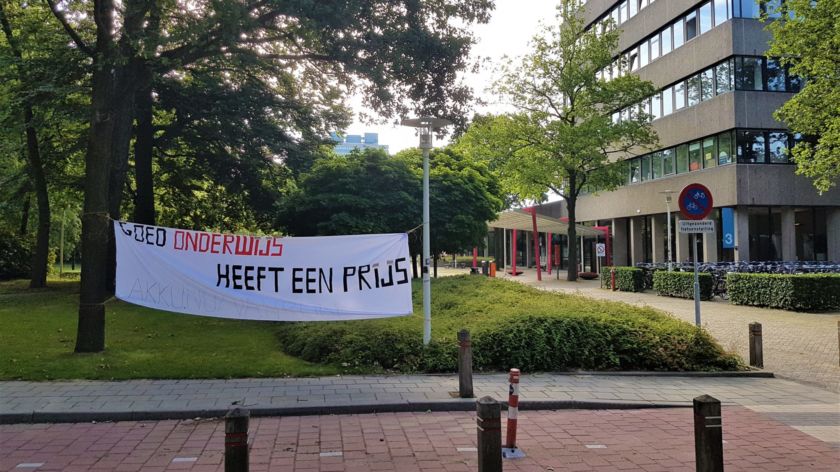Minister cuts 3.3 million euros per year for Radboud University
-
 A banner by student union AKKU against the proposed reduction in government funding. Photo: Mathijs Noij
A banner by student union AKKU against the proposed reduction in government funding. Photo: Mathijs Noij
According to the Dutch Minister of Education Ingrid van Engelshoven’s official cabinet response to the Van Rijn committee report, Radboud University can expect less government funding in the future. Although the cuts are not quite as high as expected, government funding for Radboud University will decrease by 3.3 million euros. Below, we answer five questions.
1. What is the Van Rijn committee?
The committee, named after President Martin van Rijn (PvdA), was tasked with reviewing government funding for Dutch higher education. Various bottlenecks played an important role, including growing student numbers, internationalisation, perverse incentives in the current funding model, and capacity problems in the exact science and technical science programmes. Minister Ingrid van Engelshoven (D66) received the committee’s report, entitled Wissels om (‘Changing Track’), on 15 May.
2. What does the report contain?
The most striking recommendation was to redistribute government funding for universities. Van Rijn proposed to redistribute 70 million euros among the universities starting next year, with the technical universities receiving the most at the expense of general universities like Radboud. According to initial calculations, Radboud University will see a reduction of 3.26%, which amounts to roughly ten million euros per year.
3. Will the minister adopt these recommendations?
The minister will adopt many of the recommendations. But Radboud University no longer has to fear a discount of ten million euros. The minister has set this at 3.3 million euros for a total annual contribution to Radboud University of 313 million. The current amount will not be affected over the next two years. Radboud University isn’t the hardest to be hit by this redistribution (see graph).
In addition to these amounts, general universities may also redistribute funds internally, from the arts and humanities faculties to the exact sciences. Exactly how and how much is not yet clear.
4. What are the responses to the report?
According to protest group WOinActie, the measures will result in the dismissal of approximately 800 medical scientists and 1,200 social science and humanities scholars. In a blog post on the AKKU website, student council member Gijs Kooistra wrote: ‘This means hundreds of lecturers will likely be fired at Radboud University.’
Thousands of people took to Twitter this weekend to voice their concerns, including Nijmegen researchers. ‘The exact sciences deserve the money, no doubt about it,’ wrote political scientist Kristof Jacobs. ‘The problem is that this money is being taken away from the social sciences and the humanities.’
According to Dutch language expert Marc van Oostendorp, ‘It’s the kind of move you’d expect to see in Hungary: just get rid of the trouble-makers. It’s also based on the false assumption that graduates in these disciplines would struggle to find jobs.’
Even researchers in the exact sciences are voicing their concern about the Van Rijn recommendations. Twelve members of the KNAW Young Academy, hard science scholars themselves, started a petition against the measures proposed by the Van Rijn committee. This petition has since been signed by 265 professors and researchers, and even two Dutch rectors.
5. What now?
Student union AKKU spent the weekend creating banners, which are now hanging all over the campus. ‘We’ve joined forces with other groups around the country to organise protests,’ reads a message on the union’s website. WOinActie will meet later this week to discuss new actions, with the opening of the academic year being the most logical occasion for a protest.



